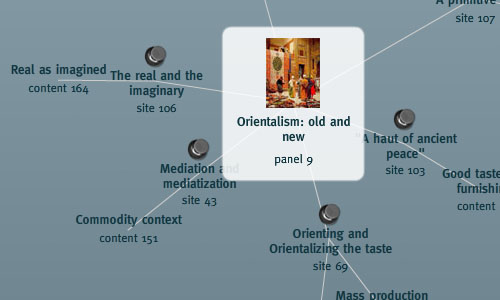“Beyond the Book” Digital Humanities Conference
Digital Humanities, Events,
2/3/08
Yesterday I was at UC Davis for the “Beyond the Book” Conference on the digital humanities—which was something of an eye-opener for me as far as providing some broader context for the work we do at Vectors. My perspective on this field tends to be very narrowly project-focused, so it was good to have my horizons expanded a bit with both a sense of the history of digital humanities scholarship as well as the obstacles facing those trying to do this kind of work today—work which still lacks the kind of legitimacy within the academy that would make it a less risky choice for junior scholars.
There seemed to be a genuine interest and energy in the room directed towards making it possible for more institutions, scholars, designers and programmers to participate in this kind of work. A number of Vectors projects were featured throughout the day, along with intriguing excerpts from And Then It Was Now by Frances Dyson and a preview of Precision Targets, the project I’m currently working on with Caren Kaplan. Sharon Daniel joined the proceedings virtually from Berlin, where Public Secrets is currently being shown at the Transmediale festival, and I got the chance to speak a bit about the connections between music composition and interactive design, while showing an early version of a visualizer for Vectors project databases (more on that in a future post).
Thanks to Caren Kaplan, Carolyn de la Pena, Jennifer Langdon, the technical staff and everyone else involved at UC Davis for putting on such an informative event and for featuring Vectors so generously.
“Public Secrets” at Transmediale; “Beyond the Book” conference at Davis
Announcements, Digital Humanities, Events,
1/7/08
A few tidbits of news to share with you today:
Public Secrets, the Webby-honored interactive documentary I designed with Sharon Daniel, will be exhibited at the Transmediale festival for art and digital culture in Berlin in late January/early February.
In addition, the Davis Humanities Institute is hosting a one-day conference on February 1 entitled “Beyond the Book: Humanities Scholarship in the Digital Age” which will feature a number of Vectors personnel and alumni, including Tara McPherson, David Theo Goldberg, Sharon Daniel, Minoo Moallem, Caren Kaplan, Jenny Terry and myself, among other distinguished speakers. The day includes a keynote panel, lunchtime roundtable, and afternoon demonstration sessions. For more information on the conference, download the pdf.
Be well.
A non-linear index for fiction and non-fiction RIAs, made possible with SpringGraph
Digital Humanities, Flex, Interactive Design,
10/25/07

The interactive index from Nation on the Move.
One of the things I’m most excited about with this latest issue of Vectors is the inclusion of a new “interactive index” feature which gives users non-linear, bookmarkable access to the databases for the projects Blue Velvet and Nation on the Move. My hope is that this feature, which allows you to visually browse each database’s contents through a common ThinkMap-style interface which is completely independent of the ‘designed’ front end of each project, will bring some transparency to our authoring and design practice at Vectors. I can easily see such an index becoming a standard feature for future interactive works, both fiction and non-fiction.
Well-deserved kudos for the technology behind the index go to Mark Shepherd, a Senior Computer Scientist at Adobe who developed the open-source SpringGraph Flex component that made it all possible. Thanks to his terrific implementation, I got the first version of the index up and running in just a few hours. It’s quite easy to use and really stunning (and fun) once you get some data hopping around in there.
The indexes included in the current issue of Vectors are still rather rudimentary, and any feedback or suggestions you have are most welcome. For future projects, I plan to integrate each index directly into the work itself, so it will truly start to function like the index in a printed book. I see this as just one component of an emerging set of user experience standards that will characterize fiction and non-fiction RIAs in the immediate future.
Recent Posts
Go InSight: Composing a Musical Summation of Every Mission to Mars (Part 2)
Making music out of the data of interplanetary exploration.
Go InSight: Composing a musical summation of every mission to Mars (Part 1)
Making music out of the data of interplanetary exploration.
Cited Works from “Storytelling in the Age of Divided Screens”
Here’s a list of links to works cited in my recent talk “Storytelling in the Age of Divided Screens” at Gallaudet University.
Timeframing: The Art of Comics on Screens
I’m very happy to announce the launch of “Timeframing: The Art of Comics on Screens,” a new website that explores what comics have to teach us about creative communication in the age of screen media.
The prototype that led to Upgrade Soul
To celebrate the launch of Upgrade Soul, here’s a screen shot of an eleven year old prototype I made that sets artwork from Will Eisner’s “The Treasure of Avenue ‘C’” (a story from New York: The Big City) in two dynamically resizable panels.
Categories
Algorithms
Animation
Announcements
Authoring Tools
Comics
Digital Humanities
Electronic Literature
Events
Experiments
Exemplary Work
Flash
Flex
Fun
Games
Graphic Design
Interactive Design
iPhone
jQuery
LA Flash
Miscellaneous
Music
Opertoon
Remembrances
Source Code
Typography
User Experience
Viewfinder
Wii
Archives
July 2018
May 2018
February 2015
October 2014
October 2012
February 2012
January 2012
January 2011
April 2010
March 2010
October 2009
February 2009
January 2009
December 2008
September 2008
July 2008
June 2008
April 2008
March 2008
February 2008
January 2008
November 2007
October 2007
September 2007
August 2007
July 2007
June 2007
